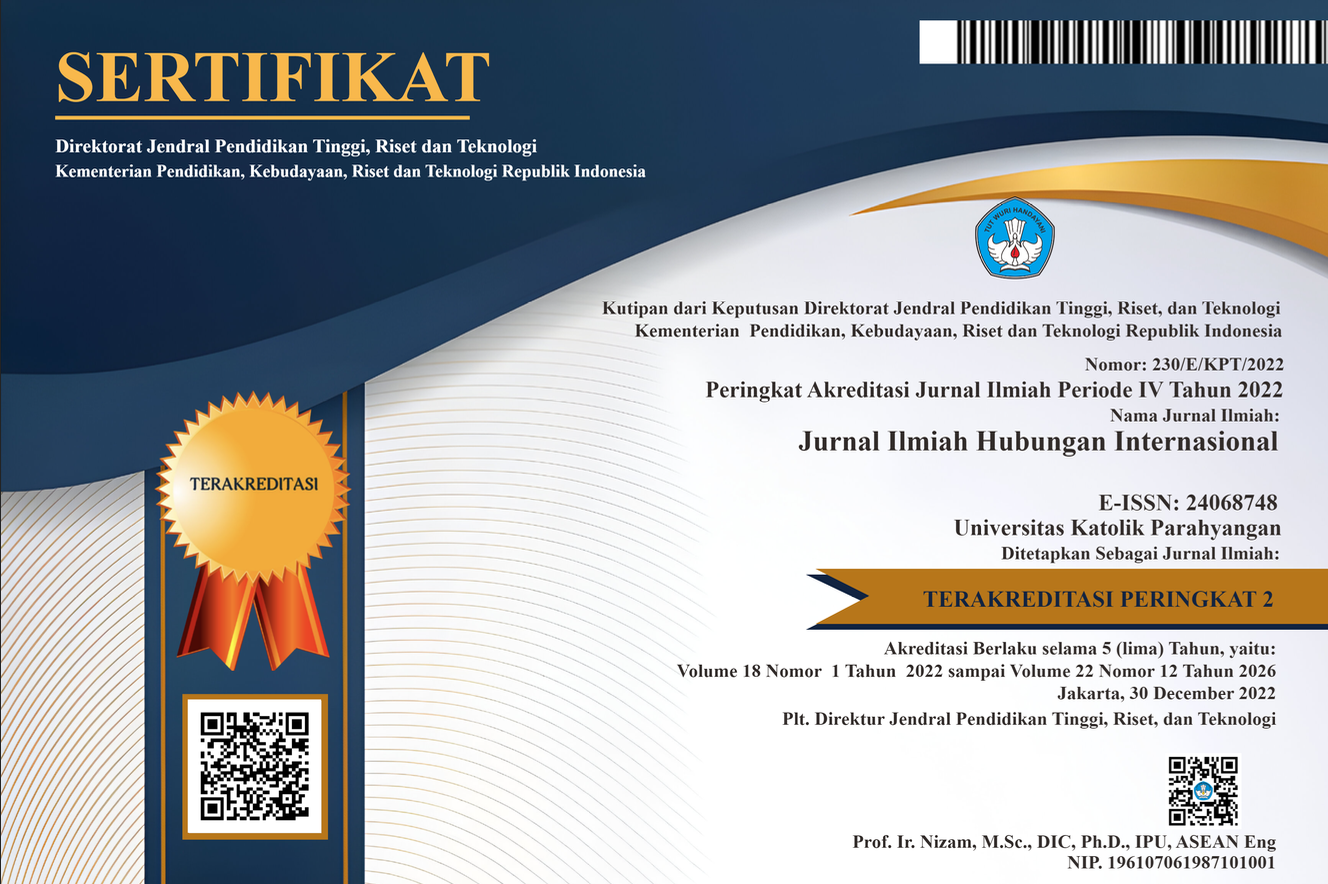Jejaring Advokasi Masyarakat Sipil di Asia Tenggara: Studi Kasus Task Force on ASEAN Migrant Workers (2007-2010)
DOI:
https://doi.org/10.26593/jihi.v11i2.2535.%25pAbstract
Artikel ini membahas mengenai advokasi Satuan Tugas Buruh Migran ASEAN (TF-AMW) terhadap ASEAN dalam perlindungan hak-hak buruh migran periode 2007-2010. TF-AMW merupakan suatu jejaring masyarakat sipil yang berupaya menekan ASEAN sebagai organisasi regional guna mengadopsi instrumen yang dibuatnya agar seluruh negara di Asia Tenggara meratifikasi standar internasional dalam perlindungan dan pemajuan hak-hak buruh migran. Dengan metode kualitatif, penelitian ini berupaya menganalisis bagaimana jejaring TF-AMW terbentuk, bagaimana strategi advokasi yang diterapkan untuk mengadvokasi ASEAN, dan bagaimana hasil dari advokasi tersebut. Penelitian ini menarik kesimpulan bahwa belum berhasilnya advokasi TF-AMW dipicu oleh terbatasnya ruang politik dari ASEAN kepada kelompok masyarakat sipil, dominannya norma-norma ASEAN Way yang sebenarnya mencerminkan bagaimana organisasi ini memandang hak-hak buruh migran sebagai isu HAM, dan tidak adanya momentum politik.
References
“Justice and Peace Commission of Hong Kong Catholic Diocese.
“Task Force on ASEAN Migrant Workers”, dalam http://www.hkjp.org/files/ files/ focus /humanright/ task%20 force%20on%20ASEAN%20Migrant.pdf (diakses pada 15 Maret 2015 pukul 16.03 WIB).
Acharya, Amitav. (2004).”How Ideas Spread: Whose Norms Matter? Norm Localization and Institutional Change in Asian Regionalism”. International Organization 58 (2): 239–275.
______________. (2008). ASEAN at 40: Mid-Life Rejuvenation. Foreign Affairs, 1-3.
Asian Forum for Human Rights and Development, “Civil Society’s Engagement with the ASEAN Human Rights Body,” http://www.FORUMASIA.org /index 2. Php ? option =com_content & do _pdf = 1 &id=2153 (diakses pada 7 Maret 2015).
Atol, Dorottya. (2010). NGOs As Norm-Constructors: The Human Rights Activism of Asian NGOs and Their Role in Shaping The Regional Human Rights Discourse. Sydney: University of Western Sydney.
Bryman, Alan. (2004). Social Research Methods (2nd Edition). New York: Oxford University Press.
Farbenblum, Bassine, Eleanor Taylor-Nicholson, dan Sarah Paoletti. (2013). Akses Buruh Migran Terhadap Keadilan di Negara Asal: Studi Kasus Indonesia. New York: Open Society Foundation.
Gomez, James and Robin Ramcharan. (2014). Introduction: Democracy and Human Rights in Southeast Asia. Journal of Current Southeast Asian Affairs 3/2014: 3–17
Greene, Shawn. (2013). “ASEAN’s Demographic Dividend.” ASEAN Briefing November 25. Dalam http://www.aseanbriefing.com/news/2013/11/25/asean-demographic-dividend .html# s t h a slvWkuuZJ.dpuf (diakses pada 18 April 2015 pukul 14.20 WIB).
Huelser, Sarah and Adam Heal. “Moving Freely? Labour Mobility in
ASEAN.” Asia-Pacific Research and Training Network on Trade. Brief No. 40 June 2014.
ILO Regional Office for Asia and the Pacific. (2010). The ASEAN Forum on Migrant Labour (AFML): Background information booklet / Tripartite Action for the Protection and Promotion of the Rights of Migrant Workers in the ASEAN Region (ASEAN TRIANGLE project). Bangkok: ILO Regional Office for Asia and the Pacific.
International Labour Organization. “ILO Declaration on the
Fundamental Principles and Rights at Work,” dalam http://www.ilo.org/ declaration/lang--en/index.htm (diakses pada 22 Februari 2015 pukul 11.01 WIB).
Neumann, Lawrence W. (1997). Social Research Method: Qualitative and Quantitative Approach. Edisi Ketiga. Amerika Serikat: Allyn and Bacon.
Office of the High Commissioner for Human Rights. What are human rights?”, dalam http://www.ohchr.org/EN/Issues/Pages/ WhatareHuman Rights.aspx (diakses pada 8 Maret 2015 pukul 20.17 WIB).
Piper, Nicola. “Governance of Migration and Transnationalisation of Migrants’ Rights: An Organisational Perspective.” COMCAD Arbeitspapiere - Working Papers No. 22, 2007. Bielefeld: Center on Migration, Citizenship and Development.
Task Force on ASEAN Migrant Workers. (2009). Civil Society Proposal: ASEAN Framework Instrument on the Protection and Promotion of the Rights of Migrant Workers. Singapore: Task Force on ASEAN Migrant Workers.
________________________________. “Advocacy for Protection of Migrant Workers Rights Moves into High Gear”. Dalam http://www.workersconnection.org/ articles .php?more=124 (diakses pada 28 April 2015 pukul 20.14 WIB).
The ASEAN Secretariat, “ASEAN Human Rights Declaration,” dalam http://www.asean.org/news/asean-statement-communiques/item/asean-human-rights-declaration (diakses pada 8 Maret 2015 pukul 20.42 WIB).
The United Nations, “International Migrant Day: 18 December”. Dalam http://www.un.org/en/events/migrantsday/index.shtml (diakses pada 28 April 2015 pukul 20.27 WIB).
UN Women Asia Pacific Regional Office. (2013). Managing Labor
Migration in ASEAN: Concerns for Women Migrant Workers. Bangkok: UN Women Asia Pacific Regional Office, 11-16.
UNESCAP, Statistical Yearbook for Asia and the Pacific 2011, (Bangkok, 2011), hlm.15, dalam http://www.unescap.org/stat/data/syb2011/ESCAP-syb2011.pdf (diakses pada 1 Mei 2015 pukul 08.06 WIB).
Viotti, Paul R. dan Mark V. Kauppi. (2010). International Relations Theory. New York: Pearson.
Wawancara dengan Angeline Shannan, Aktivis ALIRAN Malaysia pada 27 April 2015.
Wawancara dengan Brahm Press, aktivis Mekong Migration Network Thailand pada 14 Mei 2015.
Wawancara dengan Kun Wardana Abyoto, Direktur UNI Global Union Asia dan Pasifik (UNI-APRO) pada 19 Mei 2015.
Wawancara dengan Navuth YA, Direktur Eksekutif CARAM Kamboja pada 1 Mei 2015.
Wawancara dengan Rafendi Djamin, Direktur Eksekutif HRWG pada 7 Mei 2015.
Yong, Ong Keng. “’Growth, Employment, and Decent Work,’ remarks at Asian Employment Forum” dalam www.aseansec.org/20826.htm. (diakses pada 1 Mei 2015 pukul 08.09 WIB).
Downloads
Published
How to Cite
Issue
Section
License
This journal uses Creative Commons license (CC BY). We allow readers to read, download, copy, distribute, print, search, or link to the full texts of its articles and allow readers to use them for any other lawful purpose. The author must be aware that the article copyrights will be fully transferred to Jurnal Ilmiah Hubungan Internasional only if the article is accepted to be published in the journal through signing of the Copyrights Transfer Agreement. Authors are allowed to resend their manuscript to another journal or intentionally withdraw the manuscript only if both parties (JIHI and Authors) have agreed on the related issue. Once the manuscript has been published, authors are allowed to use their published article under Jurnal Ilmiah Hubungan Internasional copyrights.








